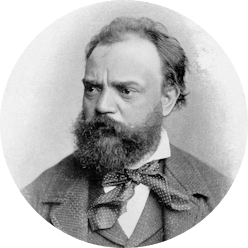
Антонин Дворжак
September 8, 1841 - Nelahozeves (Czech Republic) — May 1, 1904 - Prague (Czeck Republic)
About
Antonín Dvořák, from Prague to New York
The composer of the New World Symphony, Antonín Dvořák, was a gifted child. He made a difficult start; his father rejected his vocation, money was scarce, his violin tuition was bad and he played in a second-rate orchestra. Despite all, he was a passionate student who would not give up on his music. He was to have a brilliant career successively as an instrumentalist in the Prague Orchestra, Director of the New York Conservatory and above all as one of the most prominent composers, highly acclaimed by the Austrian emperor.
Antonín Dvořák's multiple influences
Inquisitive, honest and wayfaring, Dvořák preferred to assimilate different influences poetically and emotionally rather than attempt to revolutionise musical language. He subtly integrated into his music the Slavic tones of his homeland, Smetana’s opera being one of his references. Of a romantic disposition, he analysed and played Richard Wagner's scores, which he knew off by heart. His classical nature and fascination for great musical forms lead him to adopt Johannes Brahms as master and mentor. Their admiration was mutual as Brahms recommended him to all the greatest European conductors. Dvořák thus led his life as a composer and left touching, magnificently orchestrated works coloured with the lyricism of popular folklore and rhythms sparkling with evidence.
If Dvořák’s operas follow in the steps of Smetana, (the freshness of Rusalka in 1901 and the ambition of formal grandeur in 1903 in Armida), this master will, however, be principally remembered for his nine symphonies, granddaughters of Brahms, or his chamber music with its refined nostalgia evoking the melodic gifts of a Franz Schubert. Dvořák’s Slavic charm can be placed somewhere between nationalism and timeless Romanticism.

